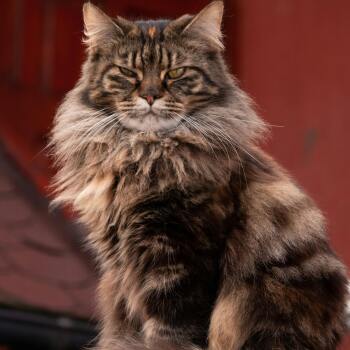Maine Coons

Meet the gentle giants of the cat world—the Maine Coon. Known for their enormous size, tufted ears, and equally big hearts, these affectionate companions bring the best of both worlds: rugged good looks and a deeply loyal personality. Whether they’re lounging across your lap or chatting you up in the kitchen, life with a Maine Coon is never dull.
Personality with Presence
Despite their lion-like appearance, Maine Coons are famously sweet-natured and easygoing. They’re known for being incredibly tolerant with children and cat-friendly dogs, making them one of the most popular breeds for multi-pet homes. Their intelligence is equally impressive—some can even learn how to play fetch or respond to verbal commands. And yes, they talk! Maine Coons love to “converse” with soft chirps and trills that are surprisingly gentle for their size.
Quirky and Lovable
If you’ve got a Maine Coon in your life, you know they’re full of character. These cats love following you around like a shadow, always curious and never far from the action. They’re not usually lap cats, but they’ll happily curl up next to you, always wanting to be close. One thing to watch? Their thick, luxurious coats require regular brushing to prevent tangles—especially around the ruff and tail. And don’t be surprised if your Maine Coon has an unusual love for water—they’re one of the few breeds known to splash in sinks or hop in the shower!
Built for the Elements
Hailing from the chilly state of Maine, this breed evolved with a thick, weather-resistant coat, strong build, and tufted paws that function like snowshoes. Today, they’re equally content indoors, where they can climb cat trees, explore every room, and claim the highest perch as their own. They're adaptable to most home environments, but like all cats, they thrive with enrichment, companionship, and a little extra grooming love.
Genetic Health Concerns for Maine Coons
- Hypertrophic Cardiomyopathy (HCM)– This inherited heart disease is unfortunately common in Maine Coons. It causes thickening of the heart walls and can lead to heart failure if not caught early. Signs are subtle—labored breathing or decreased activity—so regular checkups and early screening with echocardiograms are vital, especially in middle age.
- Feline Aortic Thromboembolism (FATE)– FATE is a painful and dangerous condition where a blood clot blocks circulation, often to the hind legs. It’s a known complication of heart disease like HCM. Sudden paralysis or extreme vocalization is an emergency—immediate veterinary attention is critical.
- Hip Dysplasia– Although more commonly discussed in dogs, hip dysplasia affects many Maine Coons. This inherited joint issue can cause pain, stiffness, or lameness in one or both hind legs. Pelvic X-rays during routine spay/neuter procedures can help with early detection, and treatments range from joint supplements to surgery.
- Patellar Luxation– This condition involves the kneecap slipping out of place, causing an occasional skip in your cat’s step. Though mild cases may require no intervention, more severe forms can lead to arthritis or lameness and may benefit from surgical correction.
- Renal Disease– Kidney failure is one of the most common chronic illnesses in aging cats, and Maine Coons are no exception. Symptoms like increased thirst, weight loss, and vomiting often emerge gradually. Early diagnosis and supportive care, including dietary changes, can extend both quality and quantity of life.
- Gingivitis and Dental Disease– Dental issues like gingivitis are especially common in this breed. Inflammation in the gums can lead to more serious infections if left untreated. Routine dental cleanings and home care help prevent painful dental disease later in life.
- Blood Type Awareness & Neonatal Isoerythrolysis (NI)– Purebred cats, including Maine Coons, may carry less common blood types such as B or AB. If a Type A kitten nurses from a Type B mother, a dangerous condition called neonatal isoerythrolysis can occur. Blood typing and careful breeding practices help prevent this fatal reaction in newborns.
- Congenital Deafness– White Maine Coons, especially those with blue eyes, may have an increased risk of congenital deafness. A lack of response to sound cues may be more than feline aloofness—it could signal the need for a BAER hearing test. Deaf cats can still thrive indoors with a little extra care.
Ready to Learn More? We’re Here to Help!


